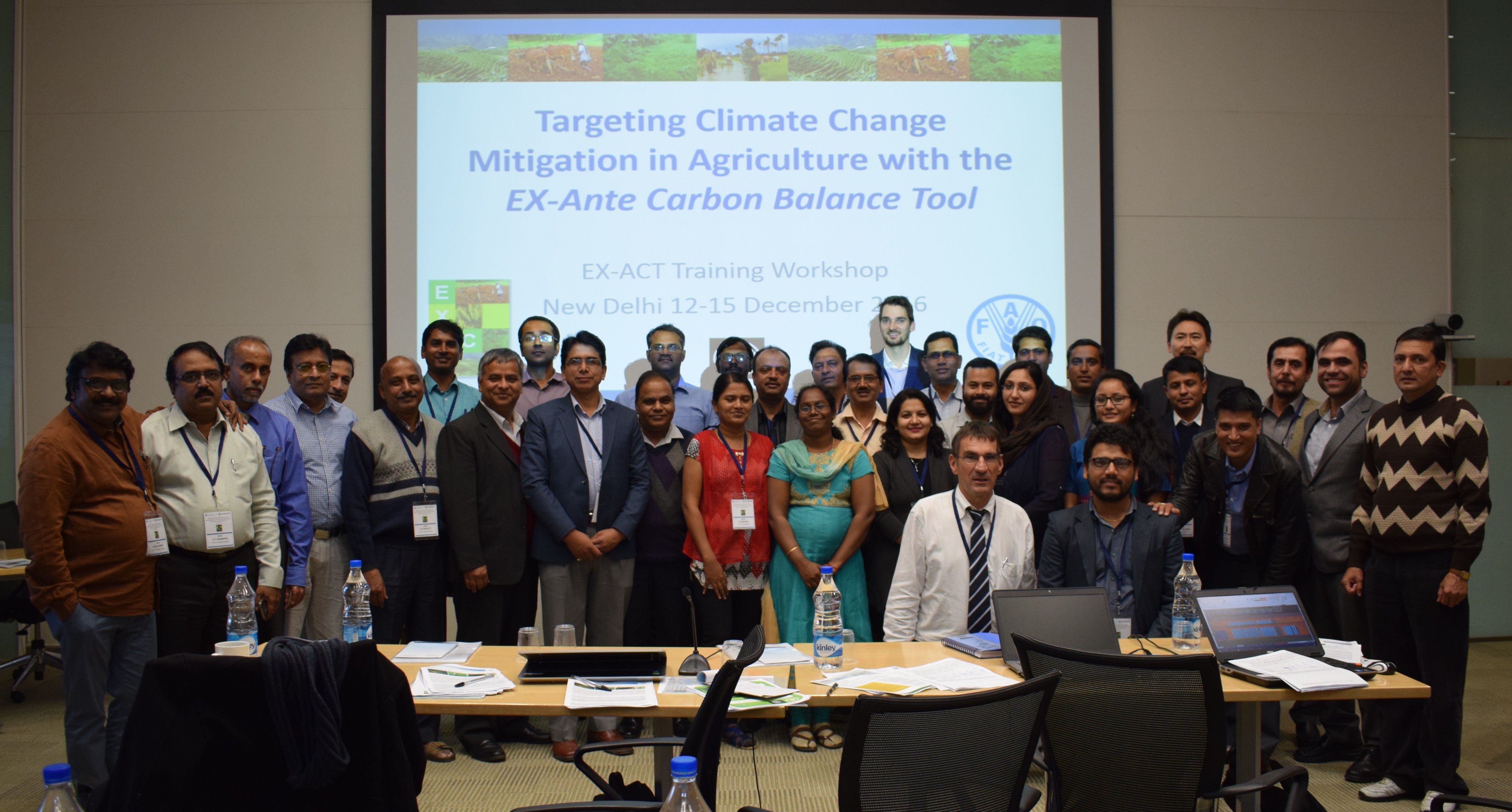Building capacities for greener agricultural investments in India and South Asia.

Expert training for improving the greenhouse gas impacts of agricultural investments in India and South Asia
FAO and the World Bank organized a four-day regional capacity building workshop from 12 to 15 December 2016 on integrating climate change mitigation targets within investment projects and policies in agriculture, forestry and land use in India and South Asia.
The training workshop provided an opportunity for decision-makers and experts from government and other stakeholders to familiarize themselves with the FAO Ex-Ante Carbon-balance Tool (EX-ACT). The EX-ACT tool is an appraisal system developed by FAO providing estimates of the impact of agriculture and forestry development projects and policies on GHG emissions and carbon sequestration. The workshop enabled policy makers to quantify climate change mitigation benefits of their current projects and policy initiatives.
Workshop participants came from a wide range of government institutions and research institutes in India, Afghanistan, Nepal, and Sri Lanka and included planners and implementers from investment projects funded by the World Bank and the Global Environment Facility (GEF).
The event responded to India’s national policy priorities identified in the National Mission for Sustainable Agriculture (NMSA) and the National Mission for a Green India (GIM). They also closely relate to India’s Intended National Determinant Contribution (INDC), the National Initiative on Climate Resilient Agriculture (NICRA) and the National Agroforestry Policy (NAP).
A wide variety of actions targeted under the National Mission for Sustainable Agriculture provide important co-benefits for lowering GHG impacts. As one example, the foreseen measures to improve the energy efficiency of irrigation systems and other farm level equipment, and increase forest cover will lead to significant climate change mitigation benefits.
The National Initiative on Climate Resilient Agriculture already utilizes the EX-ACT Tool at the pilot level and foresees to scale-up its use to all climate resilient villages under the initiative.
While the primary focus of FAO is on food and nutrition security and climate change adaptation benefits, it is at the same time important to consider environmental impacts in general and climate change mitigation in particular, as an integral element of agricultural planning processes. For this purpose the availability of scientific, consistent and cost-effective methods and processes for greenhouse gas assessments of agricultural investment projects is of key importance.
Shyam Khadka, the Representative of FAO to India identified that “this training workshop is very timely, given the Indian Government’s strong commitment to invest in field-based interventions for climate change resilience and adaptation in support of its National Mission for Sustainable Agriculture.”
With other partners, FAO and the World Bank have supported Climate Smart Agriculture since 2010 in response to the growing need for a clear and coherent strategy for managing agriculture and food systems under climate change. The application of this approach needs to combine policies, institutions and financing opportunities as well as appropriate tools that help to appraise performances of projects regarding their impact on food security, climate resilience and climate change mitigation.
In this context, the World Bank is funding a wide range of agriculture and rural development investment projects in India, South Asia and other regions that considerably contribute to achieving GHG mitigation benefits while underpinning a sectoral transformation towards efficient and profitable agricultural production systems.
Shobha Shetty, Food and Agriculture Global Practice Manager in the South Asia Region of the World Bank stated when opening the workshop: “While food and nutrition security and climate change adaptation have always the first priority, it is at the same time important to consider environmental impacts in general and climate change mitigation in particular, as an integral element of agricultural planning processes. For this purpose the availability of scientific, consistent and cost-effective methods and processes for greenhouse gas assessments of agricultural investment projects is of key importance.”
The EX-ACT Tool allows to evaluate all sub-sectors of the agriculture, forestry and land use sector and also applies to the fishery sector and aquaculture. Utilized so far in more than 60 countries, investment projects totaling USD18 billion have been appraised for the GHG impacts. In addition, more than 2,600 experts have been trained in workshops and through e-learning since 2010.
The main objectives of the EX-ACT training workshop are to provide an overall knowledge of why to appraise the carbon balance of investment projects and policies and develop the capacity of experts from the Government of South Asian countries, key staff and consultants from World Bank-funded projects as well as other relevant stakeholders to estimate the GHG impacts of agriculture, forestry and land use projects and policies.
